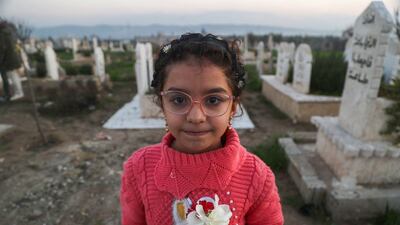In a moving interview with The National this week, Syrian earthquake survivor Mohammed Jaafar was succinct when reflecting on the catastrophe that struck his native land and neighbouring Turkey on this day last year – “The earthquake changed our lives.”
Twelve months on from the 7.8-magnitude tremor that killed an estimated 60,000 people, left 1.5 million homeless, flattened entire neighbourhoods and ruined essential infrastructure, millions of survivors are indeed living changed lives. For Mr Jaafar and many more like him, the disaster forms a kind of inflection point that divides their lives into pre and post-earthquake periods.
For those Syrians who were affected by the earthquake – whether they were struggling to get by in their war-torn homeland or were living a challenging existence as refugees in Turkey, life would have likely been difficult before February 6, 2023, but the months that followed have been punishingly precarious. This is because the two countries’ circumstances and paths to recovery are very different.
Immediately after the earthquake, many countries – including the UAE – were able to co-ordinate with Ankara to ensure rescue teams, medics, food, clothing and other critical supplies reached the southern Turkish provinces that were worst affected. Northern Syria, on the other hand, was inauspicious territory for an international relief effort given that the government’s writ in many areas did not run, challenged as it was by years of war that left dozens of rival armed factions in charge. A lack of governance, the legacy of a decade of conflict, as well as a lack of oversight and access for aid agencies meant that many Syrians, already at a disadvantage, were unable to truly avail of the help that might have been provided.
Over the past year, the Turkish government has utilised its resources to begin an ambitious programme of rebuilding that is beginning to help devastated communities get back on their feet. On the other side of the border, millions of Syrians still live in sub-standard displacement camps and face shortages of even essentials such as food, fuel and clean water. Meanwhile, many charities and aid groups are reporting that their relief efforts are being stymied by funding cuts. The World Food Programme’s general food assistance programme across Syria has been hit by funding shortages and CARE Turkey this week reported that although it was able to reach 42,000 households in north-west Syria with food vouchers and cash assistance last year, cuts mean those numbers will fall significantly in 2024.
To compound the situation, many of the earthquake-related problems in Syria require specialised, long-term action. The psychological damage done by the traumatic events of February 6, 2023, has taken a toll on the most vulnerable. This week, the Save the Children charity reported that many boys and girls who survived the earthquake are “struggling to process and cope with everything they have endured”. Helping them to overcome the anxiety and distress caused by losing family members or their home will take years.
Unemployment, exacerbated by the earthquake, is another chronic problem that has the malign effect of worsening many associated issues, pushing more people to leave an already-depopulated country. In terms of infrastructural challenges, the World Bank’s Syria Earthquake 2023 Rapid Damage and Needs Assessment states that the physical damage caused by the earthquake is estimated at $3.7 billion, while losses are estimated at $1.5 billion, bringing the total estimated impact to $5.2 billion.
All this shows that funding cuts in Syria aid are acutely dangerous and fail to appreciate the long-term nature of the challenges faced by quake-hit areas of the country. Some countries have been stepping up relief efforts. Last month, the Emirates Red Crescent released details of the humanitarian aid it is helping to provide in the disaster zone. This includes efforts to finish 1,000 housing units across seven locations in Latakia, maintaining and equipping 40 schools that cater for 20,000 students as well as working with the Syrian Arab Red Crescent to distribute food, winter clothing and blankets.
Those who have survived the earthquake need a united and focused international effort. The problems faced in Syria, exacerbated by one of the 21st-century’s worst natural disasters, have not gone away and there needs to be a strong re-focusing of attention on ways to get millions of people’s lives – changed as they may be – back on track.
Read more of The National's coverage of the 2023 earthquakes in Turkey and Syria:
How to rise to the challenge of rebuilding after the Turkey earthquake
Is Istanbul prepared for another earthquake?
After Turkey's earthquake, voters put their trust in Erdogan to rebuild













